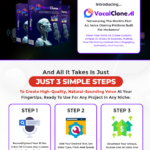The internet, once a vast digital frontier, has evolved into a thriving marketplace. It’s a place where anyone with a computer and an idea can turn their passion into profit. But how do you navigate this digital landscape to turn your potential into real earnings?
This guide is your compass. We’ll explore various online avenues, from content creation to e-commerce, and provide actionable tips to help you start your journey. Whether you’re a seasoned digital nomad or a curious beginner, you’ll find valuable insights to unlock your online earning potential.
My Proven Way to Make $100-$200 Per Day With 0 Investment – Watch THIS FREE Video to START >>

Identifying Your Golden Niche: A Roadmap to Online Success
The digital age has democratized entrepreneurship, offering boundless opportunities to turn passions into profitable ventures. The first step on this journey is identifying a profitable niche. A niche, in simple terms, is a specific segment of a market with unique needs and preferences. By focusing on a niche, you can tailor your offerings to a specific audience, increasing your chances of success.
Understanding Your Interests and Passions
A great starting point is to reflect on your hobbies and interests. What are you naturally drawn to? What topics could you talk about for hours? Your passions can be a goldmine of potential niche ideas.
For instance, if you’re a gardening enthusiast, you could create a blog or YouTube channel sharing tips on plant care, gardening hacks, or sustainable gardening practices. If you’re a tech geek, you might consider building a website reviewing the latest gadgets or offering tech support services.
Tools and Techniques for Identifying Niche Markets
Once you have a general idea of your interests, it’s time to delve deeper into market research. Here are a few tools and techniques to help you identify profitable niches:
- Keyword Research: Use tools like Google Keyword Planner or SEMrush to discover keywords that people are actively searching for. These keywords can provide insights into popular niches.
- Social Media Listening: Monitor social media platforms like Twitter, Instagram, and Reddit to identify trending topics and popular discussions.
- Online Forums and Communities: Engage in online forums and communities related to your interests. Pay attention to the questions people are asking and the problems they’re trying to solve.
- Competitor Analysis: Study successful online businesses in your niche to learn from their strategies. Analyze their content, marketing tactics, and customer engagement.
Market Research and Analysis
Market research is crucial to validate your niche idea and understand your target audience. By gathering data on your target audience’s demographics, interests, and behaviors, you can tailor your products or services to meet their specific needs.
Here are some key aspects to consider:
- Target Audience: Who are your ideal customers? What are their age, gender, location, and income level? What are their pain points and desires?
- Market Demand: Is there a significant demand for your product or service? Are people actively searching for solutions to the problems you aim to solve?
- Competition: Who are your competitors? What are their strengths and weaknesses? How can you differentiate yourself from the competition?
- Profit Potential: How much can you potentially earn from your niche? Consider factors like pricing, sales volume, and marketing costs.
Identifying Profitable Niches Based on Market Demand and Potential Earnings
To identify truly profitable niches, look for opportunities that combine high demand with low competition. This sweet spot allows you to capture a significant market share with minimal effort.
Here are some strategies to help you find these golden niches:
- Niche Down: Instead of targeting a broad niche, focus on a specific sub-niche. For example, instead of targeting “fitness,” you could niche down to “yoga for beginners” or “home workouts for busy moms.”
- Solve a Problem: Identify specific problems that your target audience is facing and offer solutions.
- Leverage Trends: Stay updated on current trends and capitalize on emerging opportunities.
- Consider Your Skills and Resources: Choose a niche that aligns with your skills and available resources.
By following these steps and conducting thorough market research, you can identify profitable niches that will set you up for long-term success. Remember, the key to online success is finding a niche that you’re passionate about and that has a real demand in the market.
My Proven Way to Make $100-$200 Per Day With 0 Investment – Watch THIS FREE Video to START >>
Mastering the Digital Toolkit: Essential Skills for Online Success
Once you’ve identified your niche, it’s time to equip yourself with the necessary skills to build a thriving online business. Here are some key areas to focus on:
Digital Marketing Fundamentals
Digital marketing is the engine that drives online businesses. It involves a range of strategies to attract and engage your target audience. Here are some essential digital marketing skills:
- Search Engine Optimization (SEO): SEO is the art of optimizing your website to rank higher in search engine results. By understanding keywords, backlinking, and on-page optimization, you can attract organic traffic to your website.
- Pay-Per-Click (PPC) Advertising: PPC advertising allows you to display ads on search engines and social media platforms. By bidding on relevant keywords
- Social Media Marketing: Social media platforms are powerful tools for building brand awareness and engaging with your audience. By creating compelling content and running targeted ad campaigns, you can reach a wider audience.
- Email Marketing: Email marketing is a cost-effective way to nurture relationships with your audience. By sending personalized emails with valuable content, you can drive sales and build brand loyalty.
Content Creation and Writing
Content is the lifeblood of any online business. By creating high-quality content, you can attract and retain an audience, establish yourself as an authority in your niche, and drive traffic to your website.
Here are some tips for creating engaging content:
- Know Your Audience: Understand your target audience’s interests, pain points, and preferences. Tailor your content to their needs and desires.
- Write Compelling Headlines: Your headline is the first thing people will see, so make it catchy and informative.
- Use Strong Visuals: Incorporate high-quality images, infographics, and videos to make your content more engaging.
- Break Up Your Content: Use headings, subheadings, and bullet points to make your content easier to read.
- Optimize for SEO: Use relevant keywords throughout your content to improve your search engine rankings.
Technical Skills
While you don’t need to be a tech wizard to succeed online, having some technical skills can be beneficial. Here are some essential technical skills:
- Web Development: Understanding HTML, CSS, and JavaScript can help you create and customize your website.
- Graphic Design: Basic graphic design skills can help you create eye-catching visuals for your website and social media.
- Video Editing: Video editing skills can help you create engaging videos to promote your products or services.
Online Resources and Tutorials There are countless online resources available to help you acquire these skills. Here are a few popular platforms:
- Coursera: Offers a wide range of online courses, including digital marketing, web development, and graphic design.
- Udemy: Provides affordable online courses taught by industry experts.
- YouTube: Offers a plethora of free tutorials on various topics, from SEO to video editing.
- Skillshare: Provides creative skills courses, such as graphic design, illustration, and video editing.
By mastering these essential skills, you’ll be well-equipped to build a successful online business. Remember, the journey may be challenging, but the rewards are immense. So, start learning, experiment, and never stop growing.
Choosing Your Path: Popular Online Business Models
Once you’ve honed your skills and identified your niche, it’s time to choose a business model that aligns with your interests and goals. Here are some popular online business models:
Affiliate Marketing
Affiliate marketing involves promoting other people’s products or services and earning a commission for each sale or lead generated.
- How it works: You sign up for an affiliate program, receive unique affiliate links, and share those links with your audience. When someone makes a purchase through your link, you earn a commission.
- Strategies for Success:
- Choose a Niche: Select a niche that aligns with your interests and expertise.
- Partner with Reputable Brands: Work with well-known brands that offer high-quality products and generous commission rates.
- Create Valuable Content: Produce high-quality content that helps your audience solve problems or make informed decisions.
- Build Relationships with Brands: Network with brands and affiliate managers to secure exclusive deals and promotions.
- Track Your Performance: Use analytics tools to monitor your affiliate marketing efforts and identify areas for improvement.
Blogging and Content Marketing
Blogging and content marketing involve creating valuable content to attract and engage an audience.
- Building a Loyal Audience:
- Consistent Content: Publish high-quality content regularly to keep your audience engaged.
- Engage with Your Audience: Respond to comments and messages on your blog and social media.
- Build an Email List: Collect email addresses to stay connected with your audience and promote your products or services.
- Monetization Strategies:
- Advertising: Display ads on your website through platforms like Google AdSense.
- Sponsored Content: Partner with brands to create sponsored content.
- Digital Products: Create and sell digital products like ebooks, online courses, or templates.
- SEO Best Practices:
- Keyword Research: Identify relevant keywords to optimize your content for search engines.
- On-Page SEO: Optimize your titles, meta descriptions, and headings.
- Backlinking: Build high-quality backlinks to your website.
- Technical SEO: Ensure your website is technically sound and mobile-friendly.
E-commerce
E-commerce involves selling products online.
- Setting Up Your Online Store:
- Choose a Platform: Select a platform like Shopify or WooCommerce to build your online store.
- Product Sourcing: Find reliable suppliers for your products.
- Inventory Management: Keep track of your inventory levels to avoid stockouts.
- Fulfillment: Efficiently process and ship orders.
- Marketing Your Online Store:
- Social Media Marketing: Promote your products on social media.
- Email Marketing: Send targeted email campaigns to your customers.
- Paid Advertising: Use PPC advertising to drive traffic to your store.
- SEO: Optimize your product pages for search engines.
Freelancing and Consulting
Freelancing and consulting involve offering your services to clients on a project-based or hourly basis.
- Building a Strong Portfolio:
- Showcase Your Best Work: Highlight your skills and experience.
- Get Testimonials: Collect positive feedback from past clients.
- Attracting Clients:
- Networking: Connect with other professionals and potential clients.
- Online Freelancing Platforms: Use platforms like Upwork or Fiverr to find clients.
- Cold Emailing: Reach out to potential clients directly.
- Social Media Marketing: Promote your services on social media.
By carefully considering these business models and leveraging your skills and passions, you can build a successful online business. Remember, success takes time, effort, and perseverance. Stay focused, adapt to change, and continue learning to achieve your online goals.
My Proven Way to Make $100-$200 Per Day With 0 Investment – Watch THIS FREE Video to START >>
Building a Strong Online Presence: Your Digital Footprint
A strong online presence is essential for any online business. It helps you connect with your target audience, build brand awareness, and drive traffic to your website. Here are some key strategies to help you establish a strong online presence:
Creating a Professional Website or Blog
Your website is the foundation of your online business. It’s where you can showcase your work, share your expertise, and connect with your audience.
- Choosing a Domain Name: Select a domain name that is relevant to your niche and easy to remember.
- Choosing a Hosting Provider: A reliable hosting provider ensures your website is always up and running. Consider factors like uptime, speed, and customer support.
- Website Design:
- User Experience: Design your website with a focus on user experience. Make sure it’s easy to navigate and visually appealing.
- Mobile Optimization: Ensure your website is mobile-friendly to cater to the growing number of mobile users.
- Clear Call-to-Action: Guide your visitors to take specific actions, such as signing up for your email list or making a purchase.
Social Media Marketing
Social media platforms offer a powerful way to connect with your audience and build a loyal following.
- Platform Selection: Choose platforms that align with your target audience. For example, if you’re targeting a younger audience, Instagram and TikTok might be good options.
- Content Strategy: Create high-quality content that resonates with your audience. Use a mix of text, images, and videos to keep your audience engaged.
- Consistent Posting: Post regularly to maintain a consistent presence on social media.
- Engage with Your Audience: Respond to comments, messages, and questions promptly.
- Paid Advertising: Consider using paid advertising to reach a wider audience.
Email Marketing
Email marketing is a powerful tool for building relationships with your audience and driving sales.
- Building an Email List:
- Lead Magnets: Offer incentives like free ebooks, checklists, or webinars to encourage people to sign up for your email list.
- Pop-up Forms: Use pop-up forms on your website to capture email addresses.
- Social Media: Promote your email list on social media.
- Nurturing Your Audience:
- Welcome Email: Send a welcome email to new subscribers to introduce yourself and your brand.
- Regular Newsletters: Send regular newsletters with valuable content, product updates, and special offers.
- Targeted Email Campaigns: Send targeted emails to specific segments of your audience.
- Email Marketing Best Practices:
- Subject Lines: Write compelling subject lines to increase open rates.
- Personalization: Personalize your emails to make them more relevant to your audience.
- Mobile Optimization: Ensure your emails are mobile-friendly.
- A/B Testing: Experiment with different subject lines, content, and send times to optimize your email campaigns.
By implementing these strategies, you can build a strong online presence that helps you achieve your business goals. Remember, building a strong online presence takes time and effort. Be patient, be consistent, and always strive to provide value to your audience.
Continuous Learning and Adaptation: The Key to Online Success
The digital landscape is constantly evolving. To stay ahead of the curve and maintain a competitive edge, it’s crucial to embrace a mindset of continuous learning and adaptation.
Staying Updated with Industry Trends
To stay informed about the latest industry trends, consider the following:
- Industry Blogs and Podcasts: Subscribe to industry blogs and podcasts to stay updated on the latest news, insights, and best practices.
- Online Courses: Enrolling in online courses can help you acquire new skills and knowledge. Platforms like Coursera, Udemy, and LinkedIn Learning offer a wide range of courses on various topics.
- Webinars and Conferences: Attending webinars and conferences allows you to learn from industry experts and network with other professionals.
Adapting to Changes in the Digital Landscape
The digital landscape is constantly changing, so it’s important to be flexible and adaptable. Here are some tips for staying ahead of the curve:
- Embrace Emerging Technologies: Keep an eye on emerging technologies like artificial intelligence, virtual reality, and blockchain. These technologies can revolutionize the way you do business.
- Stay Updated on Social Media Trends: Social media platforms are constantly changing their algorithms and features. Stay up-to-date on the latest trends to optimize your social media strategy.
- Monitor Your Analytics: Use analytics tools to track your website traffic, user behavior, and marketing campaign performance. This data can help you identify areas for improvement and make data-driven decisions.
- Be Open to Experimentation: Don’t be afraid to experiment with new ideas and strategies. Sometimes, the best way to learn is by doing.
Building a Strong Online Community
Building a strong online community can help you connect with like-minded individuals, share knowledge, and collaborate on projects.
- Networking with Other Entrepreneurs: Join online forums, social media groups, and professional networking platforms to connect with other entrepreneurs.
- Mentorship: Seek out mentors who can provide guidance and support.
- Collaborations: Collaborate with other entrepreneurs on joint ventures or projects.
- Giving Back: Share your knowledge and expertise by writing blog posts, creating tutorials, or speaking at events.
By continuously learning, adapting, and networking, you can position yourself for long-term success in the digital age. Remember, the journey to online success is ongoing, so embrace the challenges and opportunities that come your way.
My Proven Way to Make $100-$200 Per Day With 0 Investment – Watch THIS FREE Video to START >>
Conclusion
The digital landscape offers a vast array of opportunities for individuals to earn a living online. By identifying profitable niches, acquiring essential skills, choosing the right business model, building a strong online presence, and continuously learning and adapting, you can unlock your potential and achieve financial independence.
Remember, success in the online world requires dedication, hard work, and a willingness to learn. Don’t be afraid to experiment, take risks, and embrace failure as a stepping stone to success. With the right mindset and strategies, you can turn your online dreams into reality.









